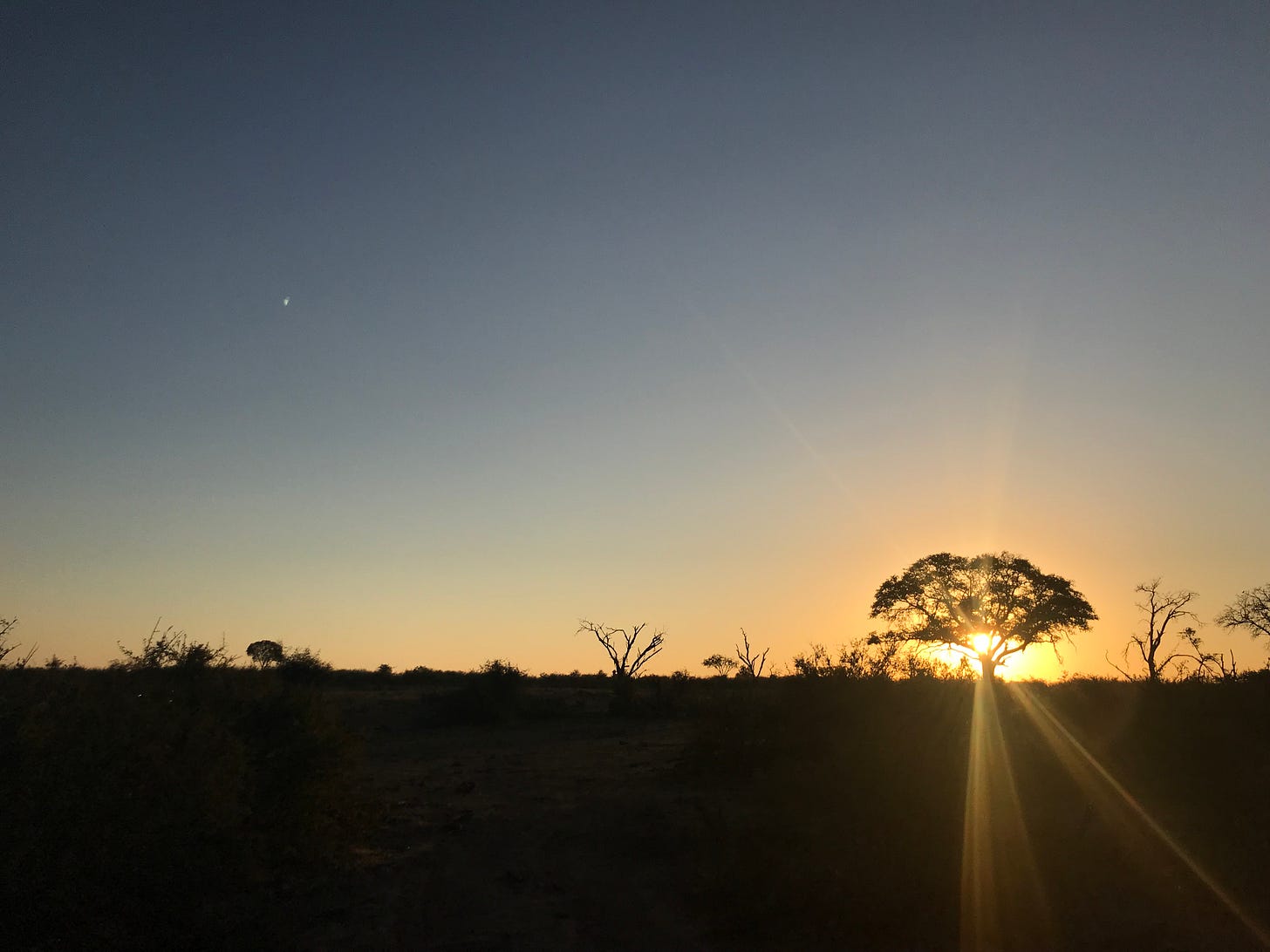Happy Monday!
I’ve been catching some warranted flack these past few weeks from well-intentioned and deeply-appreciated family and friends as it relates to my personal updates (or as they would put it, the lack thereof).
All things considered, I have chosen to write a bit of a longer one today.
Key word: “chosen.”
Enjoy (if you want)!
Quick read
The dandelion dilemma
A man who took great pride in his lawn found himself with a large crop of dandelions. He tried every method he knew to get rid of them. Still, they plagued him.
Finally, he wrote the Department of Agriculture. He enumerated all the things he had tried and closed his letter with the question: “What shall I do now?”
In due course, the reply came: “We suggest you learn to love them.”
Visual
Somewhere in the Madikwe Game Reserve in South Africa.
I listened to a podcast this past week with renowned lion tracker Boyd Varty. Beyond it just generally being an awesome podcast, it brought up a lot of nostalgia for the trip to the Madikwe Game Reserve in South Africa that I took with my family a few years ago.
Looking forward to my next reckoning with the beauty and terror that is nature.
Fact
About 1 in 200 men alive today are descendants of Genghis Khan.
This day in history
88 years ago today, on May 23rd 1934, notorious criminals Bonnie Parker and Clyde Barrow were killed by Texas and Louisiana state police while driving a stolen car near Sailes, Louisiana.
Tune
Quote
"Health is not everything, but without health, everything is nothing." // Arthur Schopenhauer
Something to ponder
“Life is the process of learning about ourselves through our encounters with the world.” // Boyd Varty
Honorable Mentions
Envy the optimist, not the genius
Personal update
I dedicated the February 28th edition of my newsletter to the concept of agency. A faculty I have found to be equal parts underappreciated and undeveloped in the world today.
The piece I wrote at the end about washing the dishes spurred lots of interesting discussions with friends / family / loyal readers alike.
As a follow-up, I’d like to share the findings of a study I came across this past week that speaks to the role that establishing a sense of agency stands to play in mediating the quality of the lives we lead.
The study goes like this:
There is a mouse in an enclosure that contains a wheel. Let’s call him Voluntary Victor since he gets to choose when he runs. Left to his own devices, Victor can be expected to spend up to 7 hours per day running up to 20km. A spry, active mouse like Victor will go on to experience the physiological benefits typically associated with consistent exercise (healthier aging, bolstered immune system, decreased levels of stress-related hormones, etc.).
Not that interesting yet right? Bear with me.
There is another mouse in an adjacent enclosure that also contains a wheel. Let’s call him Involuntary Ian since he (unfortunately) does not get to choose when he runs. Whenever Victor starts running (voluntarily), Ian is forced to keep pace on his digitally synced wheel (of doom).
So there we have it. Two mice doing the exact same exercise regimen over the exact same period of time.
A perfectly logical individual might expect Victor and Ian to have similar, if not identical, physiological benefits.
Not quite.
Ian not only misses out on the physiological benefits that Victor experiences, but actually sees a deterioration in his ability to fight disease, coupled with an increase in stress hormone levels, amongst other negative physiological effects.
The only variable? Agency.
Unlike our less-cognitively-able friend Barry the Bee who can be expected to spend his days buzzing around at the whims of his deterministic neurochemistry, blind to the purpose behind his actions, rodents and humans possess (for better or worse) a mechanism that allows us to couple context with our actions.
The same mechanism that has enabled humans’ meteoric ascension of the food chain over the last several millennia, conquering our more physically formidable foes (like Laura the Lion and Harriette the Hippopotamus), has simultaneously placed a premium on the why’s behind our what’s.
Because we wield such large prefrontal cortices, we are forced to reckon with a powerful truth of nature.
To reap the benefits of our efforts, it is not sufficient that we simply do the things. We must be intentional about the narratives that we invariably layer on top of the things we do.
Just to be clear, I’m not here to tell anyone how to live their life.
Not to get too existential on a Monday morning, but I actually have no idea why I’m here.
While I’m here, however, I would like to relay a few ideas that I find to be interesting.
And let me say, I find it to be particularly interesting that acknowledging our role as the determiner of our destiny has profound implications on the quality of the lives we lead.
Here is to paying attention to the stories that we tell ourselves.
In a world full of (self-perceived) Involuntary Ians, here is to being a Voluntary Victor.
Pun most certainly intended.
Until next week,


